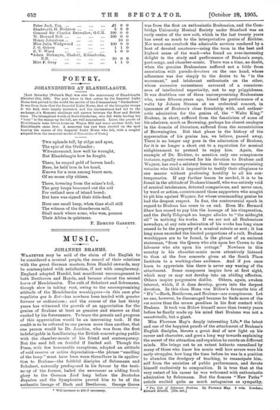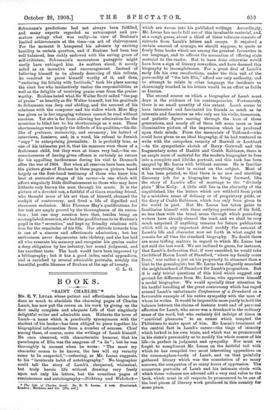W1tATEVER may be said of the claim of the English
to be considered a musical people, the record of their relations with the great German masters, from Handel onwards, may be contemplated with satisfaction, if not with complacency. England adopted Handel, lent munificent encouragement to both Beethoven and Haydn, and became almost the second home of Mendelssohn. The cult of Schubert and Schumann, though slow in taking root, owing to the uncompromising attitude of the Mendelssohn worshippers—in this case plus royalistes que le Roi—has nowhere been tended with greater fervour or enthusiasm ; and the course of the last thirty years has witnessed the growth of an appreciation for the genius of Brahms at least as genuine and sincere as that excited by his forerunners. To trace the genesis and progress of this appreciation would be an interesting task. If the credit is to be referred to one person more than another, that one person would be Dr. Joachim, who was from the first indefatigable in familiarising the British concert-going public with the chamber-music of his friend and contemporary. But the seed fell on fruitful if limited soil. Though the Press, with few honourable exceptions, adopted an attitude of cold reserve or active depreciation—the phrase " smelling of the lamp" must have been worn threadbare in its applica- tion to Brahms—the faithful disciples of Schumann and Schubert, naturally predisposed in his favour by the testi- mcmy of the former, hailed the newcomer as adding fresh glory to the German Lied long before the Deutsches Requiem and the Symphonies proved him to be of the authentic lineage of Bach and Beethoven. George Grove
• Will increase to C50 if necessary.
was from the first an enthusiastic Brahmsian, and the Cam- bridge University Musical Society under Stanford was an early centre of the new cult, which in the last twenty years has owed so much to the interpretative genius of Richter. Nor must one overlook the admirable services rendered by a host of devoted amateurs—using the term in the best and highest sense of the word—who found an ever-increasing delight in the study and performance of Brahms's songs, part-songs, and chamber-music. There was a time, no doubt, when the genuine Brahmsians suffered not a little from association with pseudo-devotees on the one hand, whose adherence was due simply to the desire to be " in the movement," and intolerant enthusiasts on the other, whose excessive earnestness savoured of a conscious- ness of intellectual superiority, not to say priggishness. It was doubtless one of these uncompromising Brahmsians who, some fifteeen years ago, hissed the performance of a waltz by Johann Strauss at an orchestral concert, in ignorance of Brahms's close friendship with, and enthusi- astic admiration for the genius of, the " Waltz King." Brahms, in short, suffered from the fanaticism of some of his admirers, much as Browning, perhaps his closest analogue in the domain of literature, suffered from the eccentricities of Browningites. But that phase in the history of the appreciation of his genius has, we believe, passed away. There is no longer any pose in the admiration of Brahms, for it is no longer a short cut to a reputation for musical enlightenment to pretend to enjoy him. Again, the example of Dr. Richter, to mention only one conspicuous instance, equally renowned for his devotion to Brahma and Wagner, has read a salutary lesson to those uncompromising votaries who think it impossible to testify their allegiance to one master without professing hostility to all his con- temporaries. If any further lesson be needed, it is to be found in the attitude of Brahms himself, who was entirely void of musical intolerance, detested comparisons, and never once, by word or action, countenanced those supporters who sought to pit him against Wagner, for whose commanding genius he had the deepest respect. In fine, the controversial epoch in regard to Brahms has come to an end. Even Mr. Bernard Shaw has ceased to pay him the homage of his vituperation, and the Daily Telegraph no longer alludes to " the midnight oil " in noticing his works. If we are not all Brahmsians nowadays, at any rate admiration of his works has long since ceased to be the property of a musical coterie or sect ; it has long since exceeded the limited proportions of a cult. Brahma worshippers are to be found, in the phrase of an eminent statesman, "from the Queen who sits upon her Crown to the labourer who sits upon his cottage." Nowhere in this country is his chamber-music more attentively listened to than at the free concerts given at the South Place Institute to a working-class audience. And if you once learn to appreciate him there is never any waning of the attachment. Some composers inspire love at first sight, which may or may not develop into an abiding affection. Others inspire progressive dislike. Others, again, awaken interest, which, if it does develop, grows into the deepest devotion. In this class Hans von Billow's favourite trio of " B's "—Bach, Beethoven, and Brahms—are conspicuous. Let no one, however, be discouraged because he finds more of the res set'era than the serum gaudium in his first contact with Brahma. It took von Billow himself more than twenty years before he finally made up his mind that Brahma was not a maestrinello, but a giant.
Miss Florence May's deeply interesting Life,* the latest and one of the happiest proofs of the attachment of Brahms's English disciples, throws a great deal of new light on his career and character, and goes a long way towards explaining the secret of the attraction and repulsion he exerts on different minds. She brings out to an extent hitherto unrealised by many of those who know his music well how severe were his early struggles, how long the time before he was in a position to abandon the drudgery of teaching, to emancipate him. self from the anxieties of public performance, and devote himself exclusively to composition. It is true that at the very outset of his career he was welcomed with enthusiastic admiration by Schumann. But the famous "New Paths" article excited quite as much antagonism as sympathy.
• The Life of Johannes Brahma. By Florence May. vols. London s Edward Arnold. [21s. net.]
Schumann's predictions had not always been fulfilled, and many experts regarded as extravagant and pre- mature eulogy what was really—in view of Brahms's limited achievements at the time—an act of clairvoyance. For the moment it hampered his advance by exciting hostility in certain quarters, and if Brahma had been less well balanced, less richly endowed with the saving grace of self-criticism, Schumann's momentous panegyric might easily have unhinged him. As matters stood, it merely acted as an incentive and encouragement. Instead of believing himself to be already deserving of this tribute, he resolved to prove himself worthy of it, and thus, "enduring his felicity with fortitude," took his place among the elect few who instinctively realise the responsibilities as well as the delights of receiving praise even from the praise- worthy. Brahma hated what Sir Walter Scott called "the pap of praise" as heartily as Sir Walter himself, but his gratitude to Schumann was deep and abiding, and the account of his relations with the composer and his widow which Miss May has given us in her engaging volumes cannot be read without emotion. Yet she is far from allowing her admiration for the musician to blind her to his shortcomings as a man. These shortcomings were largely the defects of his qualities,—his dis- like of pretence, insincerity, and ceremony; his hatred of interviews, lionisers, and, in a word, his refusal to furnish " copy " to enterprising journalists. It is probably true, as one of his intimates put it, that his manners were those of a frolicsome child, but they were at times very bad,—his un- consciousness of having given offence is certainly no excuse for his appalling tactlessness during his visit to Denmark after the war of 1864. But when all reserves have been made, the picture given of Brahms in these pages—a picture based largely on the first-hand testimony of those who knew him best at successive stages of his career—is one which will afford singularly little disillusionment to those who may have hitherto only known the man through his music. It is the picture of a devoted son, a faithful if at times exacting friend, who thought more of his art than of himself, shunned the cockpit of controversy, and lived a life of dignified and strenuous seclusion. Miss Florence May's qualifications for her task are amply proved by the thoroughness of its execu- tion ; but one may mention here that, besides being an accomplished musician, she had the good fortune to be Brahms's pupil in the " seventies," and kept up friendly relations with him for the remainder of his life. Iler attitude towards him is one of a sincere and affectionate admiration ; but her enthusiasm never degenerates into idolatry, and she has laid all who venerate his memory and recognise his genius under a deep obligation by her industry, her sound judgment, and her excellent taste. The book would have been improved by a bibliography ; but it has a good index, useful appendices, and is enriched by several admirable portraits, notably the beautiful profile likeness of Brahma at the age of twenty.
C. L. G.



















































 Previous page
Previous page